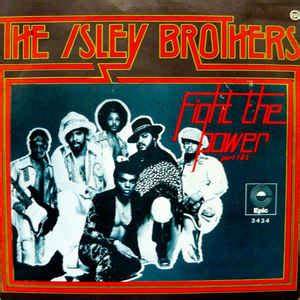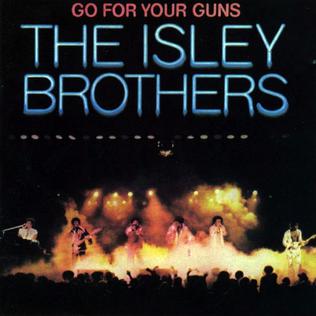Related Research Articles
The Isley Brothers are an American musical group originally from Cincinnati, Ohio, that started as a vocal trio consisting of brothers O'Kelly Isley Jr., Rudolph Isley and Ronald Isley in the 1950s. With a career spanning over eight decades, the group has enjoyed one of the "longest, most influential, and most diverse careers in the pantheon of popular music".

"Twist and Shout" is a 1961 song written by Phil Medley and Bert Berns. It was originally recorded by the Top Notes, but it did not become a hit in the record charts until it was reworked by the Isley Brothers in 1962. The song has been covered by several artists, including the Beatles, Salt-N-Pepa, and Chaka Demus & Pliers, who experienced chart success with their versions.

T-Neck Records was a record label founded by members of the R&B/soul group The Isley Brothers in 1964, which became notable for distributing the first nationally-released recordings of Jimi Hendrix, their guitarist, and which later became a successful label after the Isleys began releasing their own works after years of recording for other labels, scoring hits such as "It's Your Thing" (1969) and "That Lady" (1973).

"It's Your Thing" is a funk single by The Isley Brothers. Released in 1969, the anthem was an artistic response to Motown chief Berry Gordy's demanding hold on his artists after the Isleys left the label in late 1968.

"That Lady" is a song by the Isley Brothers, made famous in 1973 when it was reworked in a funk rock style. The song was originally performed as "Who's That Lady?" in a classic R&B vocal style by the Isley Brothers in 1964, inspired by the Impressions.

"Fight the Power" is a song recorded by the Isley Brothers, who released the song as the first single off their landmark album, The Heat Is On. The song is notable for the usage of the word bullshit, which was censored during radio airplay.
"Live It Up, Pt. 1 & 2" is a funk/rock song released by the Isley Brothers, on their album of the same name in 1974 on their T-Neck imprint.

Winner Takes All is the seventeenth studio album by The Isley Brothers and released on T-Neck Records and their seventh record to be distributed by Epic Records on August 21, 1979. The album included the number-one R&B hit, "I Wanna Be With You" and the top 20 UK disco hit, "It's a Disco Night ".

Live It Up is the twelfth album by the Isley Brothers, released on September 7, 1974. It was their second major-distributed album with Epic Records under their T-Neck subsidiary.

The Heat Is On is the thirteenth studio album by American soul and funk group The Isley Brothers, released June 7, 1975 on T-Neck Records and Epic Records. Written and produced entirely by the group, the album was recorded in 1975 at Kendum Recorders in Burbank, California. The group implemented many acoustic and electric instruments during its recording, including guitar, piano, and synthesizer. Primarily a funk and soul outing, The Heat Is On features musical elements of rock music, and it is divided between uptempo funk songs and subdued smooth soul-ballads.

Harvest for the World is the fourteenth studio album released by The Isley Brothers on their T-Neck imprint on May 29, 1976.

Go for Your Guns is the fifteenth album by the Isley Brothers. Released on April 16, 1977, on their T-Neck label, it was also the band's fifth album to be distributed by their deal with Epic. Released in mid-April 1977, the album peaked a month later at No. 1 on Billboard's Top Soul chart, and at No. 6 on the Billboard 200.

Showdown is an April 1978 album by the Isley Brothers. It was released on their T-Neck Records label. Singles released from the album include the #1 funk/disco hit, "Take Me to the Next Phase" and the top 20 R&B slower, "Groove With You". The album became another platinum album for the Isley Brothers. It was remastered and expanded for inclusion in the 2015 released CD box set The RCA Victor & T-Neck Album Masters, 1959-1983.

Go All the Way is the eighteenth album released by The Isley Brothers for their T-Neck imprint on April 19, 1980.

The Real Deal is the 21st album released by The Isley Brothers on August 7, 1982. The album is notable for the group's decision to alter their trademark funk rock sound in the 1970s with the then-current early 1980s electro funk scene dominated by Rick James, Prince, Zapp and The Gap Band.

Between the Sheets is the 22nd album released by The Isley Brothers on their T-Neck imprint on April 24, 1983. The album is notable for the title track, the follow-up hit "Choosey Lover", and the ballad "Touch Me". The song also appeared in the 2007 comedy film, Norbit.
"The Pride" is a 1977 funk song by The Isley Brothers, released on their T-Neck imprint. The song, which was the first single released from their album, Go For Your Guns, was written as a warning to politicians to be the leader that the people need and to others who want change reminding them that "the pride makes (them) feel that (they) belong". The song was one of several socially conscious political songs the Isleys recorded throughout the 1970s including "Fight the Power Pts. 1 & 2" and "Harvest for the World". While the song peaked at sixty-three on the pop charts, it reached number-one on the R&B singles chart becoming the group's third number one on the chart.

"Take Me in Your Arms " is a song written by the premier Motown songwriting/production team of the 1960s Holland–Dozier–Holland. The first hit recording was sung by Kim Weston in 1965. It was most popular in 1975 when it was recorded by the Doobie Brothers.
David Edward Townsend was an American musician best known as the guitarist for the R&B band Surface.

"It's a Disco Night " is a 1979 club hit for The Isley Brothers, released on their T-Neck label as the second single from their gold-certified album, Winner Takes All. The song is notable for being one of the few disco-based songs the Isley Brothers released. Beforehand, the group were known for their mixture of funk, rhythm and blues and rock. The song was led by brother Ronald Isley while his brothers Kelly and Rudolph Isley chanted "rock don't stop" in the background. The song briefly charted on the Billboard Hot 100 peaking at number 90, hitting number 27 on the R&B chart. Outside the US, "It's a Disco Night" reached number 14 on the UK Singles chart.
References
- ↑ The Isley Brothers. “Take Me to the Next Phase, Pts. 1-2”. Allmusic: Review by Ed Hogan. https://www.allmusic.com/song/take-me-to-the-next-phase-pts-1-2-mt0048480428
- ↑ Whitburn, Joel (2004). Top R&B/Hip-Hop Singles: 1942-2004. Record Research. p. 278.